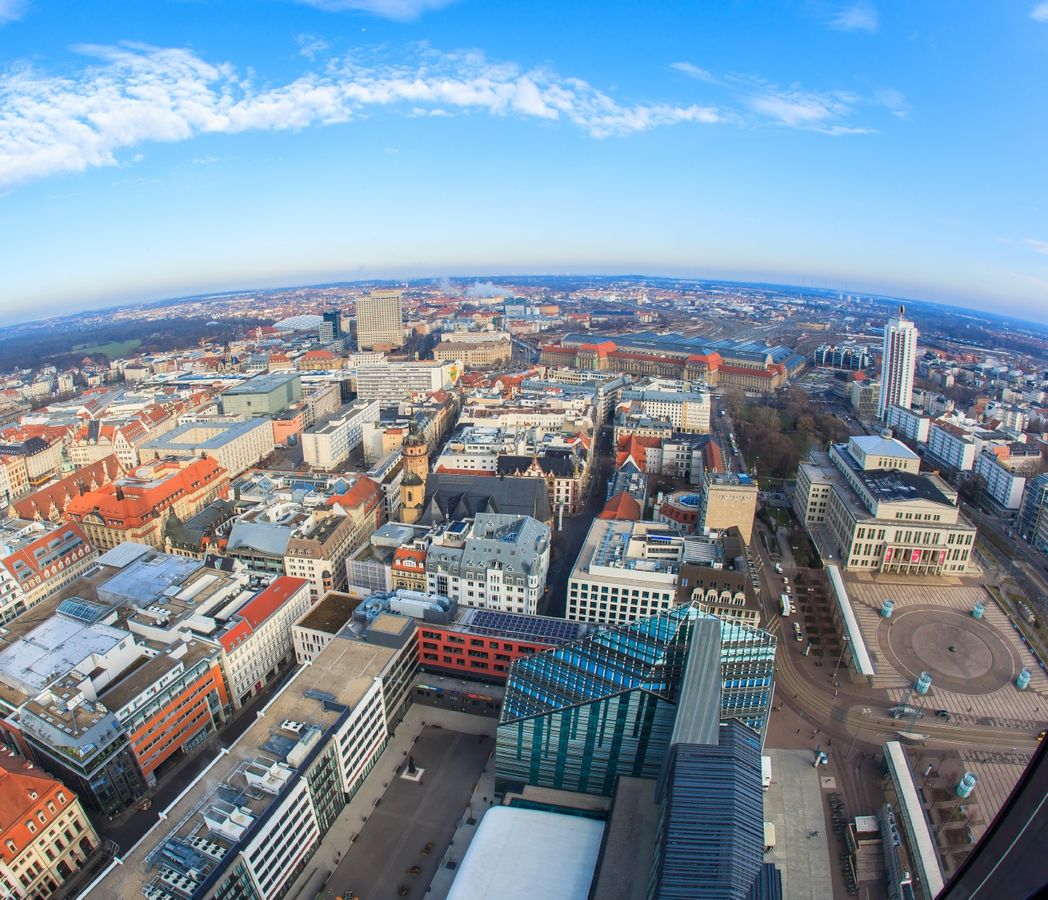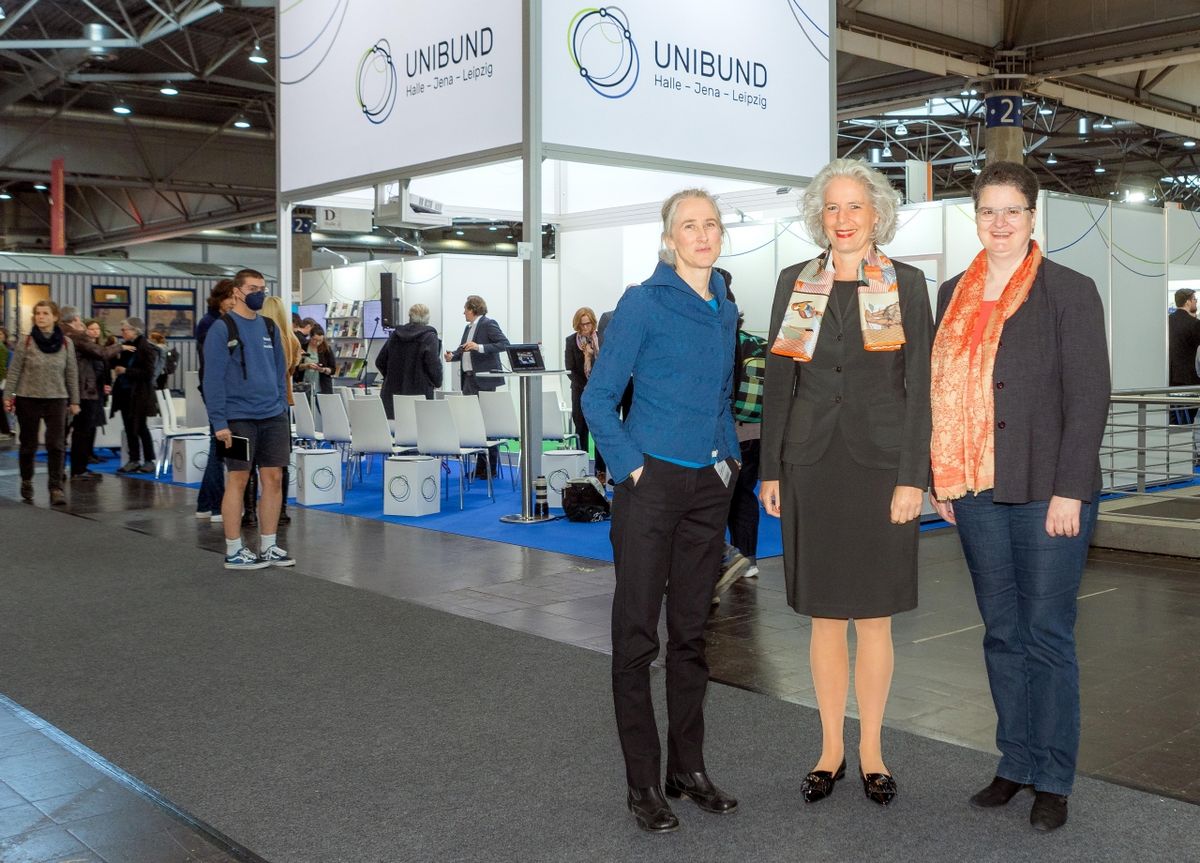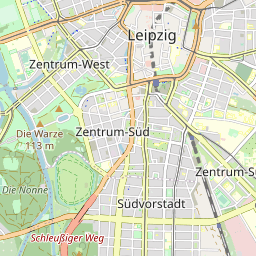Our university cooperates with numerous higher education and non-university research institutions in Leipzig as a centre of science as well as throughout Central Germany. We work closely together in the areas of research, teaching and transfer.
We are a member of the Leipzig Science Network, which was founded in 2018. The network will deepen the cooperation between higher education and non-university research institutions and at the same time enhance Leipzig’s national and international profile as a centre of science. As a central collaborative interface, the Leipzig Science Network provides ongoing support to all of the institutions in solving their common tasks. The Leipzig Science Network’s cluster activities create direct links between the levels of work and management, facilitate synergies in research and administration, and free up resources for new fields of activity. Through transparency and by jointly developing the strategic research profile of Leipzig’s scientific institutions, the network strengthens innovation, funding eligibility and research output as well as the visibility and attractiveness of the region.
Associated Insitutions
We also maintain a variety of cooperation agreements with universities as well as research and business institutes in the Central German region of Halle-Jena-Leipzig.
University of Leipzig Medical Center
University of Leipzig Medical Center has close ties with our university, combining research, teaching and patient care.
IFB AdiposityDiseases
The IFB AdiposityDiseases was established as a joint institution of the Faculty of Medicine at Leipzig University and the University of Leipzig Medical Center (coordinator: Professor Michael Stumvoll).
Affiliated institutes
Affiliated institutes at Leipzig University are legally independent institutions that perform tasks jointly with the University that cannot be adequately fulfilled on their own (pursuant to Sect.102 of the Saxon Higher Education Act (SächsHSG)). On the basis of a cooperation agreement, the range of tasks of the University is meaningfully supplemented and expanded. The rectorate decides on the temporary recognition, which can be extended if the prerequisites continue to exist.
The University cooperates with the following Affiliated Institutes:
- Albrecht‐Daniel Thaer Institut für Agrarwissenschaften e.V.
- Leibniz Insititute for the History and Culture of Eastern Europe (GWZO), Leipzig
- Institut für Nichtklassische Chemie e.V.
- Institut für Versicherungswissenschaften e.V.
- Leibniz Institute for Jewish History and Culture – Simon‐Dubnow‐Institut
- Leipzig Bach Archive
- Institut für Angewandte Informatik e.V.
- Smart City Hoyerswerda gGmbH
Forum for the Study of the Global Condition
The forum is a joint humanities and social science research platform run by universities and non-university research institutions in Leipzig, Halle-Wittenberg, Jena and Erfurt. It investigates how different stakeholders deal with cross-border migration, trade, financial flows and the transfer of ideas, and in doing so, create and determine what can be called “the global”.
NON-UNIVERSITY RESEARCH FACILITIES
The research fields of our university are the base for intensive cooperation with various scientific institutions in and around Leipzig.
Helmholtz Centre for Environmental Research – UFZ
The UFZ is one of the world’s leading environmental research centres. It identifies approaches to the sustainable use of natural resources for the benefit of mankind and the environment.
Helmholtz Institute for Metabolic, Adiposity and Vascular Research – HI-MAG
The institute combines the clinical expertise at the University Hospital Leipzig with the innovative approaches from the preclinical research of the Helmholtz Zentrum München - German Research Center for Environmental Health.
Helmholtz-Zentrum Dresden - Rossendorf e. V. – HZDR Research Site Leipzig
In Leipzig, scientists from the Helmholtz-Zentrum Dresden-Rossendorf work on topics in the fields of energy and health. They develop radiolabelled substances and use these in process studies.
Max Planck Institute for Biogeochemistry – MPI-BGC
The MPI-BGC´s research is dedicated to the study of global biogeochemical cycles describing the interactions between biosphere, atmosphere, geosphere and the entire climate system.
Max Planck Institute for Evolutionary Anthropology – MPI-EVA
The MPI-EVA explores the history of mankind through comparative analyses of genes, cultures, cognitive abilities and social systems of past and present human populations and groups of primates, which are closely related to humans.
Max Planck Insitute of Geoanthropology – MPI-GEA
The MPI-GEA explores the concrete man-made conditions of the progressive destabilization of the Earth system, the systemic interactions between atmosphere, hydrosphere, cryosphere and biosphere with the newly emerged technosphere, possible tipping elements in this overall system and, consequently, the limits of socio-ecological carrying capacity and the resulting socio-economic and cultural response times.
Max Planck Institute for Human Cognitive and Brain Sciences – MPI-CBS
The MPI-CBS explores cognitive abilities and brain processes in humans.
Max Planck Institute for Mathematics in the Sciences – MPI-MIS
The research areas of the MPI-MIS are complex systems and mathematical analysis, especially in neurobiology and perception, biology as well as economic and social systems.
Fraunhofer Institute for Cell Therapy and Immunology – IZI
The IZI researches and develops novel solutions to problems in the areas where medicine, the biosciences and engineering sciences meet.
Fraunhofer Center for International Management and Knowledge Economy – IMW
The IMW focuses on fundamental processes of change in business, science, politics and society in the globalised world.
Leibniz Institute for Jewish History and Culture – Simon Dubnow (DI)
The Dubnow Institute (DI) is an interdisciplinary institute for the study of Jewish life in Central and Eastern Europe from the Middle Ages to the present.
Leibniz Institute for Regional Geography – IfL
Under its “New Geographies of Europe” programme, the IfL investigates spatial structures and current spatial developments through to the theoretical and historical foundations of regional geography with a focus on Central and Eastern Europe.
Leibniz Institute of Surface Engineering – IOM
The IOM deals with application-oriented basic research in the field of how radiation interacts with matter.
Leibniz Institute for Tropospheric Research – TROPOS
The Leibniz Institute for Tropospheric Research (TROPOS) investigates physical and chemical processes in the contaminated troposphere.
Leibniz Institute for the History and Culture of Eastern Europe – GWZO
The Leibniz Institute for the History and Culture of Eastern Europe at Leipzig University conducts comparative research into the history and culture of the area between the Baltic Sea, the Black Sea and the Adriatic Sea from the early Middle Ages to the present day.
Halle Institute for Economic Research – IWH
The IWH places the understanding of the determinants of long term growth processes at the centre of the research agenda. Long term growth processes in Germany (East and West) and in Europe can only be understood in the context of economic convergence in Europe and international integration.
Leibniz ScienceCampus “Eastern Europe – Global Area” – EEGA
Together with partners from the Halle-Jena-Leipzig region, the EEGA Leibniz ScienceCampus examines processes such as migration and mobility, economic networks and political integration as well as intercultural perspectives and identities. As an integrative platform and research network, it focuses on the changing role of Eastern Europe in current and historical processes of globalisation.
Leibniz ScienceCampus “Smoke and Bioaerosols in Climate Change”
The Leibniz ScienceCampus brings together expertise on atmospheric and biodiversity research from Leipzig University; on aerosols, clouds and atmospheric processes from the Leibniz Institute for Tropospheric Research (TROPOS); on biomass combustion from the German Biomass Research Centre (DBFZ); and on water and energy cycles from the Helmholtz Centre for Environmental Research (UFZ).
Deutsches Biomasseforschungszentrum gGmbH – DBFZ
The Deutsches Biomasseforschungszentrum (DBFZ) develops new processes to enable the efficient and sustainable use of solid, liquid and gaseous bioenergy sources.
German Meteorological Service – DWD
Germany's National Meteorological Service, the Deutscher Wetterdienst (DWD), is responsible for meeting meteorological requirements arising from all areas of economy and society in Germany. The area of responsibility is defined by the statutory tasks of providing information and performing research.
Saxon Academy of Sciences and Humanities in Leipzig – SAW
At the Academy of Sciences, researchers from a wide range of disciplines meet regularly to exchange views, discuss methods and results of special research in interdisciplinary dialogues, and devote themselves to long-term basic research with a focus on the humanities.
International Partners
Boasting a multitude of partnerships with foreign universities, our university promotes international cooperation in teaching and research. Especially relevant for our strategic research fields are:
The universities of the federal states of Saxony, Saxony-Anhalt and Thuringia – Leipzig University, Martin-Luther University Halle-Wittenberg and Friedrich Schiller University Jena – joined forces in 1995 to form the Central German University Alliance. Together we carry out projects in the areas of research, teaching and transfer:
Higher education institutions in Leipzig
In addition to our university, there are the following institutions of higher education in Leipzig:
- Leipzig University of Applied Sciences (HTWK)
- Academy of Fine Arts Leipzig (HGB)
- “Felix Mendelssohn Bartholdy” Academy of Music and Theatre (HMT)
- Leipzig Graduate School of Management (HHL)
- University of Cooperative Education Leipzig
- Leipzig School of Media (LSOM).
The City of Leipzig provides a list of all higher education institutions.















































































